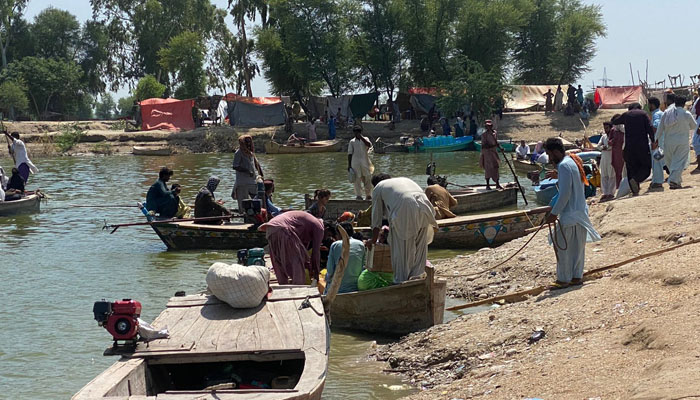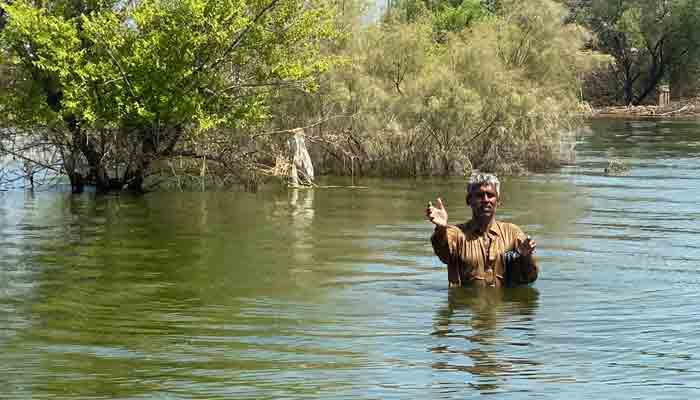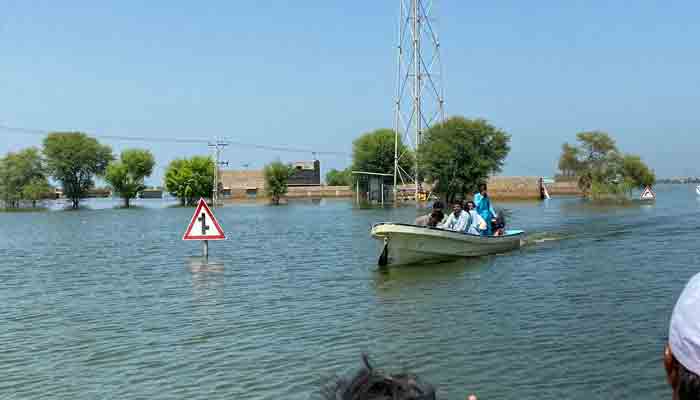Merchants of misery adding to predicament of flood victims
As the light fades and dusk approaches, Mukhtiar Ali Panhwar looks to take a boat trip to bring back potable water to his floodwater-sieged home. He and his ailing father have stayed back to protect their belongings.
“I have come to fetch water,” says Panhwar, a resident of Khairpur Nathan Shah, also known as KN Shah, a town of Dadu district. This town has been ravaged by heavy downpours and torrents from Balochistan.
The 30 to 40 kilometre stretch of the Indus Highway beyond the Johi Branch canal remains submerged, cutting off one of the main roads from the rest of upper Sindh and other provinces.
Boats of the Pakistan Navy, non-governmental organisations (NGOs) and private persons are parked along the highway. Privately-owned wooden boats are being run commercially, with their owners exploiting the miserable flood victims to make a quick buck.
“We sometimes pay Rs200 per trip, and at other times Rs250 or Rs300. If we don’t pay, we die of thirst,” Panhwar, who is a farmer, laments. “I have to make a trip daily to fetch water in a 20-litre container that I and my ailing father use for drinking and cooking.”
Like Panhwar and his father, a great many people in the city and the surrounding villages have shifted their womenfolk and children to their relatives in other districts or to relief camps.
The men themselves have stayed behind to protect their properties amid the fear of thieves looting empty houses in the flood-affected areas. Majority of the population has already left the town.
“We charge Rs300 per trip, or if you book the entire boat, you will have to pay Rs30,000 to Rs35,000,” says Abdul Hafeez Malah, who along with three others works on the diesel-engine boat that has a capacity of carrying 100 people. They have come from Sukkur with their master who wants to “make the most of this opportunity”.
People are forced to travel in these boats without life jackets, serving as a stark reminder of how this risky ride could lead to a tragedy. Three weeks ago, at least 17 people, including women and children, had drowned in the Indus River after a boat carrying flood-affected people capsized near Sehwan.
People can also be seen wading through chest-deep floodwater. If they see a boat going past them, they raise their hands and gesture for water to quench their thirst, tired from swimming and walking for miles towards land.
“I can swim to my house, but I have women and children with me, due to which I have to opt for a boat ride,” says a man in his 40s as he clambers aboard a boat.
Sixty-year-old Pyar Ali, a resident of the Arzi Naich village who along with the elderly members of his household stayed behind to take care of the cattle, has taken a boat trip to the highway to buy essential goods. He said that most of their family members need to be moved to a safer place.
This is the second time KN Shah has been submerged. The city had witnessed the same situation during the 2010 super floods. The locals blame alleged mismanagement, and deliberate cuts made to the flood protection bund and other water channels for the flood disaster.
“It’s strange that boats are chugging on water above the highway, where buses and cars would otherwise ply,” a senior journalist quips as we head to Thallo, a village-turned-island in a motorised boat. There’s water as far as the eye can see and beyond. The signs on the buildings clearly show the water has receded to some extent, but it will take weeks or even months to be drained out, says a distraught villager.
Outbreak of diseases
Doctors at a medical camp set up by the Thardeep Rural Development Programme, an NGO, have attended to hundreds of patients suffering from malnutrition, and infectious and water-borne diseases, including malaria fever, diarrhoea and skin problems, in a single day. They also provide free medicines to people.
“We have examined 400 plus patients today,” one of the doctors told The News. “Most patients suffered from diarrhoea, suspected malaria, skin diseases and general weakness.”
Ali Muhammad Kallar, manager of the organisation’s Programme for Improved Nutrition in Sindh, said they will set up more medical camps in the flood-hit areas where there’s an outbreak of diseases.
-
 Kate Middleton Knew Should Could Not Be ‘voice Of Reason’ With Prince Harry
Kate Middleton Knew Should Could Not Be ‘voice Of Reason’ With Prince Harry -
 Rihanna Has Wardrobe Malfunction At A$AP Rocky Fashion Show
Rihanna Has Wardrobe Malfunction At A$AP Rocky Fashion Show -
 Prince Harry Felt System Had ‘one Rule For Him, One For Prince William’
Prince Harry Felt System Had ‘one Rule For Him, One For Prince William’ -
 Jake Paul's Fiancée Sends Him Over The Moon Over Stunning Victory
Jake Paul's Fiancée Sends Him Over The Moon Over Stunning Victory -
 Why Prince William, Kate Middleton 'partnership' Is Important For Monarchy
Why Prince William, Kate Middleton 'partnership' Is Important For Monarchy -
 Katie Price Drama Escalates As Family Stays In Touch With Ex JJ Slater
Katie Price Drama Escalates As Family Stays In Touch With Ex JJ Slater -
 Critics Target Palace Narrative After Andrew's Controversy Refuses To Die
Critics Target Palace Narrative After Andrew's Controversy Refuses To Die -
 Sarah Ferguson’s Delusions Take A Turn For The Worse: ‘She’s Been Deserted’
Sarah Ferguson’s Delusions Take A Turn For The Worse: ‘She’s Been Deserted’ -
 ICE Agents 'fake Car Trouble' To Arrest Minnesota Man, Family Says
ICE Agents 'fake Car Trouble' To Arrest Minnesota Man, Family Says -
 Camila Mendes Reveals How She Prepared For Her Role In 'Idiotka'
Camila Mendes Reveals How She Prepared For Her Role In 'Idiotka' -
 China Confirms Visa-free Travel For UK, Canada Nationals
China Confirms Visa-free Travel For UK, Canada Nationals -
 Inside Sarah Ferguson, Andrew Windsor's Emotional Collapse After Epstein Fallout
Inside Sarah Ferguson, Andrew Windsor's Emotional Collapse After Epstein Fallout -
 Bad Bunny's Star Power Explodes Tourism Searches For His Hometown
Bad Bunny's Star Power Explodes Tourism Searches For His Hometown -
 Jennifer Aniston Gives Peek Into Love Life With Cryptic Snap Of Jim Curtis
Jennifer Aniston Gives Peek Into Love Life With Cryptic Snap Of Jim Curtis -
 Prince Harry Turns Diana Into Content: ‘It Would Have Appalled Her To Be Repackaged For Profit’
Prince Harry Turns Diana Into Content: ‘It Would Have Appalled Her To Be Repackaged For Profit’ -
 Prince William's Love For His Three Children Revealed During Family Crisis
Prince William's Love For His Three Children Revealed During Family Crisis






